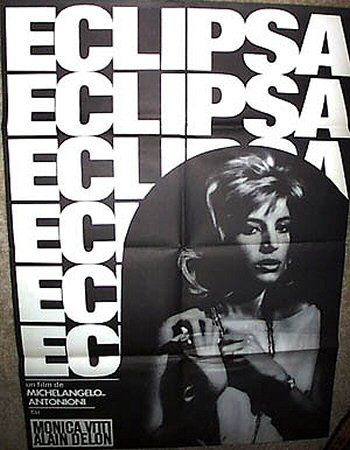If you’ve ever read Jim Romanesko’s Poynter.org media watchdog site,
check this out. It’s funny. To me, anyway.
Month: March 2005
I could never buy the
I could never buy the denouement of Taxi Driver, and I never will. Travis Bickle, suspected by Treasury agents as a nutjob assassin who almost killed Sen. Charles Palatine, is portrayed as a hero by the media for shooting a corrupt cop and two pimps in an East Side tenement building? And this shooting in some way helps the parents of Jodie Foster to find her and bring her back home to Indiana? And then the dreamily erotic Cybil Shepard is giving Travis a come-hither look in the rear-view mirror when he gives her a ride in his cab? It’s all Travis’s death fantasy… the stuff he wishes would happen as he sits on that tenement couch, bleeding profusely and eyeballing the cops in the doorway as he pretends to shoot himself in the head. The very last shot in Taxi Driver is of a seemingly startled Travis looking into his cab’s rearview mirror, and then whoosh…he’s gone. No reflection. Because Travis isn’t really there.
In her 3.31 New York
In her 3.31 New York Times piece, Caryn James mentioned a slate of recent films or plays (the Ashton Kutcher-Bernice Mac comedy Guess Who?, Neil LaBute’s This Is How It Is, etc.) that have dealt in some front-and-center way with racism. She mentioned a pair of indie films that grapple with it also (Face, A Wake in Providence) and yet, oddly, she didn’t mention Paul Haggis’ Crash (Lions Gate, 5.6), the most ambitious and stylstically assertive movie about racism to come down the pike in a long while. This Los Angeles-based ensemble drama, which I’m showing at my UCLA Sneak Preview class on Monday, is about little besides racism. It costars Don Cheadle, Matt Dillon, Brendan Fraser, Sandra Bullock, Terrence Howard, Jennifer Esposito,Ryan Phillipe (delivering his best acting yet) and Thandie Newton.
If you’re going to see
If you’re going to see Sin City, see it digitally projected.
Robert Rodriguez’s shimmering silvery black-and-white photography is heaven on the eyes, and digital makes it look that much better. The photography (and a sincere congrats to Rodriguez for getting this aspect right) is all this movie has. Sin City is geek noir, or noir for T-shirt wearing, beer-bellied guys who rarely get laid and didn’t graduate from college. Hard guys talking tough and fatalistic and cryptic, constantly shooting or slugging bad guys or getting shot or slugged themselves…sucking cigarette smoke and worhsipping women for their goodness while smacking their lips at their carnal allure….and I am telling you it’s all crap. And the odd thing, it doesn’t read like crap when you read one of Frank Miller’s graphic novels.
Sock That Choppy
I loved Crouching Tiger and all, but it’s no secret there are more ardent fans of martial-arts movies than myself.
I like aerial chop-socky the way I like musical numbers in a ’50s Arthur Freed musical — visually exciting and beautifully performed, etc., but if there’s too much exposure to restricted worlds of this sort you can start to go a bit nuts. Sublime choreography, Chinese mythology, inspired cutting…I get it but all right already.
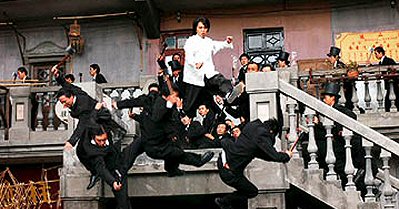
Kung Fu Hustle Stephen Chow performing obligatory single-hero-vs.-eighty-bad-guys fight sequence…done before by the Wachowski brothers and Quentin Tarantino, but never so hilariously.
That said, Stephen Chow’s Kung Fu Hustle, which I saw last night at the L.A. premiere at the Arclight, is truly something else. Part parody and partly a genre redefiner, it’s easily the funniest and most imaginatively nutso chop-socky flick I’ve ever seen.
Sony Classics is opening Hustle in New York and L.A. on April 8th and wide on April 22nd, and I can’t see it not being a huge action hit. If you’ve got genre skeptics like me saying it’s cool, you have to figure the action fans will be all the more enthusiastic….right?
< ?php include ('/home/hollyw9/public_html/wired'); ?>
Chow is a friendly, mild-mannered sort in person (we spoke last night at an after-party at The Palm in West Hollywood), but creatively he’s quite clearly a madman. Mad like Mozart or Picasso or Orson Welles. In the grip of a fine madness….unbound and flying on faith.
Kung Fu Hustle is not just imaginative and off-the-planet….it’s insane.
You can argue that when a genre film starts veering into genre parody, that’s the beginning of the end…but maybe not. The James Bond films were getting heavily spoofed in the mid ’60s and they’re still around.
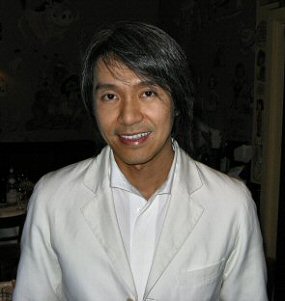
Stephen Chow at West Hollywood’s Palm Restaurant– Tuesday, 3.29, 10:05 pm.
Maybe Chow-styled lunacy is what the martial arts genre needs at this stage. Even more illogical and indulgent…losing its mind and taking a leap off the cliff.
Chow, 42, is obviously the new Jackie Chan. He’s a longtime martial arts devotee and fan of Bruce Lee known for nonsense humor (which is apparently known as “moleitau”) and playing the fool. The only other film I’ve seen of his is Shaolin Soccer , which was released in ’01. I haven’t seen Chow’s God of Cookery or King of Comedy, but I can guess what they were like.
Hustle is an effects-driven Hong Kong goofball comedy (i.e., “comedy-fu”) by way of The Matrix .
The setting is some urban pre-Communist Chinese burg, and the plot is about a gang war of sorts between the inhabitants of a slum called Pigsty Alley (which isn’t an alley but a big U-shaped tenement) and the top hat-wearing Axe Gang, which is run by Brother Sum (Chan Kwok-kwan).
Chow plays Sing, a comic kungfu smartass with a fat sidekick (Lam Tze-chung), who eventually turns out to be a man with a mission in the Keanu Reeves/Matrix mold.
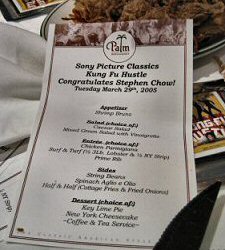
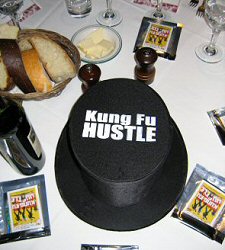
Special menu for Kung Fu Hustle dinner at Palm restaurant — Tuesday, 3.29.05, 9:40 pm; collapsable Kung Fu top hat.
There are all kinds of rumbles, ass-kickings, foot-crunchings and whatnot. The edge is in the inspired, cartoon-like lunacy of the visual imaginings, the choreography and the CGI. And also from the occasional surprise turn, like when a certain studly, good-looking warrior with a great fighting style gets his head sliced off like that…whoa.
There’s a great Roadrunner chase sequence between Sing and a fightin’, formidable character called The Landlady (Yuen Qiu)….surreal-funny, totally amped.
The final turn comes when Sing is hired by Brother Sum to break an all-powerful martial arts master called The Beast (Leung Siu-lung) out of some kind of insane asylum, and soon after realizes that he has a super-hero’s destiny. This revelation comes only at the very end, thus allowing Chow to do his dopey-ass comic stuff for most of the duration.
I asked Chow (and his interpreter, who stood next to him) if he was comfortable calling Kung Fu Hustle a martial-arts satire. “What’s a satire?” he asked.
I re-phrased by asking if Hustle is laughing at martial arts films, or laughing with them? Chow asked what the difference is. I said laughing at is basically about criticism and laughing with is about affection. “Definitely with,” he said.
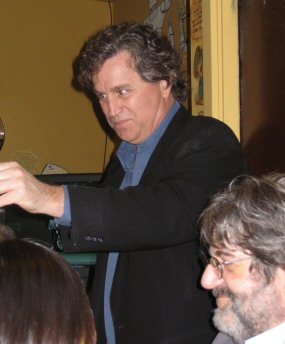
Sony Pictures Classics chief Tom Bernard offering toast to Kung Fu Hustle star-writer-director Stephen Chow.
The schmoozing at the Palm eventually gave way to a sit-down dinner. Sony chief Tom Bernard dinged on his wine glass and offered a toast to Chow, and a few minutes later Ray director Taylor Hackford did the same, praising Chow for his wit and visual pizazz.
Critics and Asian cinema scholars David Chute and Andy Klein (writing now for L.A.’s City Beat) were there also, along with Movie City News editor/columnist David Poland and a few other journos. My thanks to publicists Melody Korenbrot and Ziggy Koslowski for inviting me.
I fell off my diet by eating filet mignon and lobster, but eating steak is okay by the Atkins Diet so I guess I didn’t screw up too badly.
Sydney’s World
There are classic chase scenes and classic suspense sequences, but it’s rare to come across a really superb two-in-one. I don’t know if this has gotten around, but such a sequence — and it’s a major wow, trust me — is in Sydney Pollack’s The Interpreter (Universal, 4.22).
At the same time, it’s too bad that Universal’s marketing department has spoiled the climax by including it in their Interpreter trailer.
I’ve provided the link because it’s a free country and we can’t ignore what Universal has done, but do yourself a favor and don’t watch it. If the trailer plays before a film you’re about to see over the next month or so, run out to the lobby…seriously.

Nicole Kidman (r.) in scene from Sydney Pollack’s The Interpreter (Universal, 4.22).
It’s standard practice for trailers to show the audience a clip of every “money” scene in a forthcoming film and therefore, in the case of thrillers, ruin 90% of the surprises. But the Interpreter giveaway is especially bad because of the unusual character of what’s being ruined.
This sequence doesn’t just get you on a visceral level — the finesse that went into the editing is truly dazzling.
Let me explain by turning to a famous film lover’s book “Hitchcock Truffaut” (Random House), and an example of what makes a typically good suspense scene, as told by Alfred Hitchcock to Francois Truffaut.
A non-suspenseful approach, explains Hitch, would be to show a group of men eating in a restaurant when suddenly a bomb explodes and everyone is killed…shocking but that’s all. The suspenseful approach, he says, is to show the audience that a bomb is wrapped in a package under a restaurant table, and then tell them what time it will go off. Then a minute or so before detonation, have the men start to get up and leave but have one of them say, “Wait, I want to finish my coffee.”
Pollack and his editor, William Steinkamp, have taken a nervier approach in The Interpreter .
Instead of tipping the audience off about the certainty of coming destruction, they indicate that something bad is brewing…without revealing exactly what. They show various opposing forces (cops, bad guys, innocents) focusing on the same space or activity, and edit and score this scene so as to create a feeling of a fuse getting shorter and shorter and something about to pop.
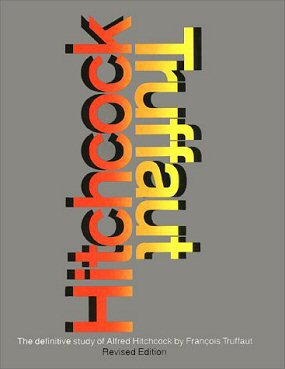
Certain people are watching others, some are oblivious to anything but their own moves, some are playing their end of the court but are unaware of the overall, and so on. And it builds and builds and then…
Just don’t watch the trailer.
I have thought this through and I am showing restraint in comparing this scene to the Popeye Doyle subway car chase scene in William Freidkin’s The French Connection. The tension penetrates just as deeply, the editing is just as assured…it’s a marvel.
And on top of the sheer mechanics of this scene, it flashes the viewer into real-life associations that stay with you — I shouldn’t be any more specific.
The film itself is about as smart and satisfying as a mainstream political thriller can get. It doesn’t just push buttons — it delivers a compassionate theme and uses that familiar Pollack element of a love affair that might happen or work out…but it’s not in the cards.
This may sound like trivial terminology, but a screenwriter friend is calling The Interpreter “the ultimate over-25 date movie. There are no movies like this around right now that my wife and I like to go to together.”
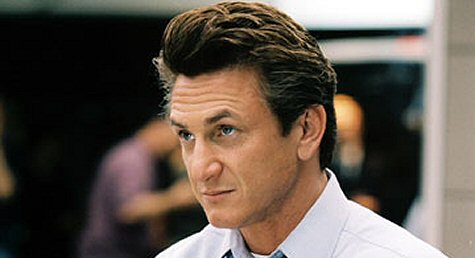
Sean Penn
A friend is telling me Penn is too gnarly and internally bothered to succeed in a leading man mode. I think he’s blind. Penn’s innate ability to suggest a feeling of having suffered emotional wounds is precisely what makes his Interpreter performance work as well as it does.
Perhaps my friend is forgetting that Penn had an emotional breakthrough in 21 Grams. With audiences, I mean…it changed everything. It turned him into this decent hurting 40ish guy who smokes.
The careful strategic weaving of the dozens of story strands that have to fit together just so and pay off in the right way in a film of this sort (a discipline that Pollack used to fine effect in The Firm and Three Days of the Condor) is damned near immaculate.
And the performances by Nicole Kidman and especially Penn (bringing a certain grit and gravitas to what might have seemed like a fairly standard romantic lead role with someone else playing it) are ripe and impassioned and true to the mark.
Theory
I don’t mean to offend anyone or sound too clunky in my thinking, but I’ve always thought people who frequently go to serious action movies (as opposed to an off-the-ground variation like Kung Fu Hustle) are expressing feelings of social impotence.
The swift, decisive, lethal moves of on-screen combatants give the disenfranchised, pushed-around male masses a temporary feeling of spiritual strength and assurance, or so goes the theory.
Which explains, obviously, why they’re so popular with young males, the most impotent group in any society.
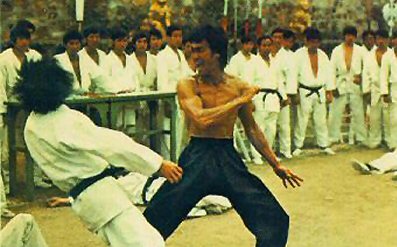
A scene from Bruce Lee’s Enter the Dragon.
It follows that in the case of hardcore fans, the more outlandish the action the greater the feelings of powerlessness.
Before anyone gets angry they should know I’m including myself in this equation. I got a definite charge from watching Tom Cruise blowing all those guys away with stylish dispatch in Collateral. But what his “Vincent” character did was in the realm of reality, or at least one that I accepted as being vaguely tethered to it.
It can be said that the widespread popularity of martial arts films in Asia, which are known for their flights into total cartoon fantasy of flying super-heroes with endless reserves of energy….it can be said that their popularity shows that feelings of social impotency run far deeper in Asia than they do here.
This is hardly a new observation, but how about some reactions?
Kid Flicks
“I loved your article about cultivating young cinema lovers. As a father of two young children — Bain, 5, and Lillie, 3 — I find myself in the same position of making sure my children grew up to not only good people but also appreciating good art.
“I’ve found that along with many of the films that you and Jett mentioned my kids will also watch silent films with me. Charlie Chaplin and Buster Keaton films are really popular around here, but my son also really liked Metropolis and The Cabinet of Dr. Calagari.
“Other non-animated favorites are John Boorman’s Excaliber, The Adventures of Robin Hood, any Tim Burton movie (except the totally forbidden Planet of the Apes) and Jean Cocteau’s Beauty and the Beast.
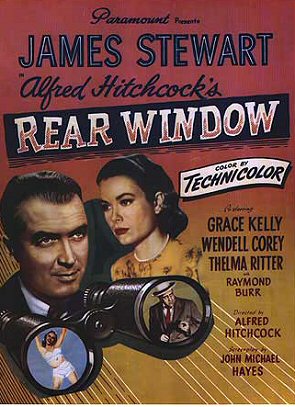
“For a long time my son would watch Dr. Strangelove over and over, referring to it as the ‘airplane Movie.’ I seriously doubt that the themes of the film were apparent to him, but somehow I think that hearing Sterling Hayden’s ‘purity of essence’ speech may have made an impression.” — unnamed husband of Karen McKibben.
“I definitely identify with your article on kids and movies. I have two young children, and I end up censoring what they watch over quality issues much more than content issues…although I’m sure at six years old my son doesn’t understand why Superbabies 2 isn’t worth the rental fee.
“It has paid off from time to time, though. A few months ago my hyperactive five year-old daughter sat perfectly still for two hours while we watched Rear Window, and she has asked to watch it again several times since. To be honest, I get a little choked up when I hear her give out a conspiratorial chuckle over what’s buried in the flower garden.” — Randall Pullen
“I saw Taxi Driver with my mom in Mexico City when I was twelve, and it changed me. I didn’t quite understand everything but it opened my eyes to a new kind of filmmaking. I don’t think your idea is bizarre. Bad movies teach youngsters that the world is black and white place where good and evil are easily identifiable and definable things. i think good movies show the world as complex and often baffling, where we all have the capability of being either good or bad, often on the same day.” — Tom Engel.
Pollack at UCLA
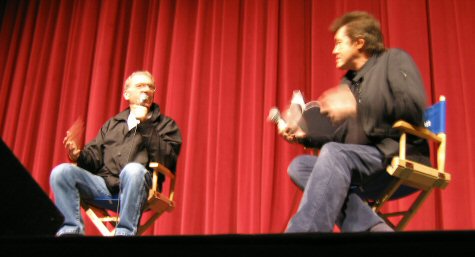
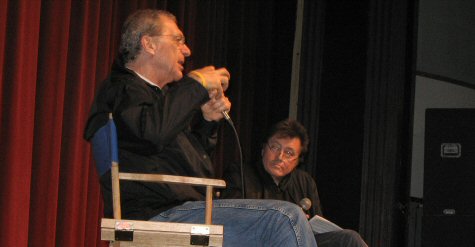
Sydney Pollack (l.) addressing UCLA Sneak Preview class after showing of The Interpreter — Monday, 3.28.05, 9:55 pm.
There’s no way James Reston
There’s no way James Reston Jr., author of “Warriors of God: Richard the Lionheart and Saladin in the Third Crusade,” is going to prove that Ridley Scott and 20th Century Fox used historical material taken from his book in the making of Scott’s Kingdom of Heaven (Fox, 5.6)…no way in hell. The basic story was in yesterday’s
New York Times. Did Scott and/or his screenwriter, William Monahan, browse through Reston’s book at some point and take a few notes? I would be astounded if they didn’t, but the supposed “smoking gun” incident — producer Mike Medavoy having sent the book to Scott in December ’01 with a letter suggesting that they collaborate — probably won’t be enough to make the case, especially since Scott had an assistant call Medavoy right back and decline. “What was said at the time was, [Scott] had a Crusade project of his own,” Medavoy told Times reporter Sharon Waxman.
Few things in life are
Few things in life are quite as downerish as a formulaic Sandra Bullock movie. Almost as gloomy is looking at the poster for such a film two or three weeks before it’s about to open, or hearing from a woman friend who doesn’t go out to films much and has never seen an Antonioni film (and almost certainly never will) that she’s really looking forward to it.
The announcement of Warner Home
The announcement of Warner Home Video’s July 5th DVD release of John Boorman’s Point Blank is…great news! The only cool-sounding extra is the commentary track featuring Boorman and Steven Soderbergh. (Soderbergh’s interview commentary with Mike Nichols on Paramount Home Video’s Catch 22 DVD was highly absorbing.) It’s a low-cost effort, all right — no docs, no deleted scenes and a couple of crappy “vintage” featurettes. Let’s hope the transfer isn’t as pinkish and bleachy looking as the MGM/UA laser disc was.
I am so deeply bored
I am so deeply bored or at least underwhelmed with all the crappy or so-so new films out there…even with all the fairly good indie films noew playing like Sergio Castellito’s Don’t Move, which has a truly amazing performance from Penelope Cruz and a first-rate one from Castellito…I am bored with even the half-good films like this one…so bored I could plotz. So bored I can barely make myself write these Wired items, but I know if I literally slap myself in the face and make myself do them the feeling will come back and I’ll be rolling again. I know what this is — I’ve been here before.
A friend said he was
A friend said he was going to a surprise 50th birthday last Saturday night for some lawyer, and that the super-secret arrangements were being handled by the guy’s wife. This struck me right away as something only a wife would do. There’s no way a guy turning 50 is on Cloud Nine about this. He may be spiritually or philosophically at peace with reaching the half-century mark, but on a gut emotional level he’s definitely not delighted with it. At the very best he has mixed feelings. I’ve known guys who were bummed when they hit 30 and a lot of people are freaked when they hit 40, so don’t talk about the big five-oh. But this lawyer guy’s wife wants to celebrate it. People who throw surprise birthday parties are always presumed to be coming from a place of love for the significant others, but if you ask me this is the wife proclaiming to their circle of friends and acquaintances that her husband is passing the official threshold into life’s older phase, and, unless he’s a workout freak, he’ll gradually be taking more in naps and staying home and reading non-fiction and being a bit less of a hot dog in the professional playing field or, if the shoe fits, less of a hound. (I mean, if he had such tendencies when younger.) And that her 50-plus husband is now more likely to be loyal…in a vaguely sleepy, domestic, I’d-rather-watch-TV sense. Wives love to subtly advertise that their husbands are less available for whatever. This is why some of them feed their husbands so much food…to make them look slightly pudgy, so they’ll be less attractive to other women.
There’s a film series that
There’s a film series that just finished at the L.A. County Museum about the paranoid movies of the 1970s (The Parallax View, Three Days of the Condor, etc.). This reminded me of a famous definition of paranoia — “knowing all the facts.” But who coined it? I was told a long time ago it was William S. Burroughs. I found an online source claiming that Woody Allen said it.
End of the Affair
I wonder (and I realize this is a vaguely cynical question) if ticket sales for Million Dollar Baby are going to go up or down this weekend because of the Terry Schiavo thing?
The Schiavo case is just about over, and I’m not just speaking about her parents’ many failed attempts to have her feeding tube re-inserted. I’m not going to get into this sad saga any more than necessary (a reader wrote on Wednesday he hasn’t been this ashamed to be an American since the Clarence Thomas hearings), but before God’s alleged grace actually steps in and releases this poor manipulated woman, a curious synergy deserves note.

Two-thirds of one of David Rees’s recent Terry Schiavo cartoons.
Has it occurred to anyone else that the flaring up and final climax of the Schiavo case, which, after all, is rooted in a medical situation that’s been going on since the early `90s…does it strike anyone else as odd that this would all come to a big conclusion less than a month after Million Dollar Baby won the Best Picture Oscar on 2.27, and only…what?…five or six weeks after the Christian right orchestrated a concerted attempt in the media to trash that movie for its death-with-dignity finale?
< ?php include ('/home/hollyw9/public_html/wired'); ?>
Think about it: the one-two punch of Schiavo plus Baby has made this into a front-and-center issue for what feels like a month and a half straight.
I’m not saying the Florida legal system waited for Clint Eastwood’s movie to open before making its final moves, but it does seem odd that the climax of the Schiavo case didn’t happen, say, early last year or whenever, or that it didn’t stay on the back burner for another six months or a year or two more before push came to shove and a certain judge finally said, okay, now‘s the time to take her feeding tube out.
At least everyone has thought hard about where they stand in this debate, which has felt pretty degrading to me, and, I imagine, a lot of others. It hasn’t been about medical reality or humanitarian concern, after all, but about the fanatical Christian right pushing their grotesque agenda in the courts and in the news media, and everyone else having little choice but to respond.
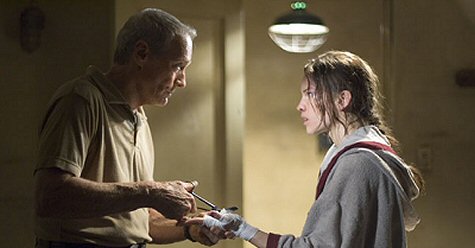
Clint Eastwood, Hilary Swank in Million Dollar Baby.
Journalist and author Chris Hitchens (“The Trial of Henry Kissinger”) said yesterday on Chris Matthews’ “Hardball” show that it would probably be more compassionate to give Schiavo a shot of morphine than put her through the presumed agonies of slow starvation.
I’ve read a disputing of this view by medical authorities in today’s New York Times (“many doctors say that patients in a persistent vegetative state, like Ms. Schiavo, feel no discomfort when the flow of nutrients through a feeding tube stops”) and they probably know what they’re talking about, but I agree with Hitchens, who was only talking about not prolonging a ghastly situation and sending her on her star-field voyage as pleasantly and expeditiously as possible.
Of course, few have the balls to say this, and no one would ever step up and do a Clint Eastwood (I mean, a “Frankie Dunn”) on the poor woman.
I’ll bet there are rightie wackjobbers out there right now who would love to attempt a commando-style raid on her hospice and take her away so they can “save” her. (Michael Mitchell of Rockford, Illinois, was arrested Thursday evening after trying to steal a weapon from a gun shop so he could “take some action and rescue Terri Schiavo,” a news story said.)

As soon as Hitchens mentioned morphine, Bill Donohue, the reactionary president of the Catholic League for Religious and Civil Rights (the one who tried to boil Kevin Smith in oil for making Dogma), sneered and harumphed and suggested there’s something wrong with Hitchens’ value system.
There is something very wrong with the value system of people pushing a rabid philosophical and political agenda, but have almost nothing to say about simple decency and compassion.
God protect us from purist zealots of whatever stripe. They are the bringers of atrocities…the worst people on this planet except for child molesters and those who practice deliberate cruelty. This isn’t very nice, but when I think of the religious right I get an image in my head…an image of the good men and women of Loudon, wearing 17th Century grab and cheering the burning of Father Grandier (Oliver Reed) in Ken Russell’s The Devils.
A reader sent me these David Rees panel cartoons yesterday. They so hit the nail on the head.
Rees got started as a political cartoonist in late ’01 (he wanted to assemble his feelings about post-9/11 Armageddon into some kind of form), and has three books out — “Get Your War On,” “Get Your War On II” (the latest) and “My Filing System is Unstoppable.” Reese’s stuff is fantastic. If he comes to speak in L.A., I’m there.
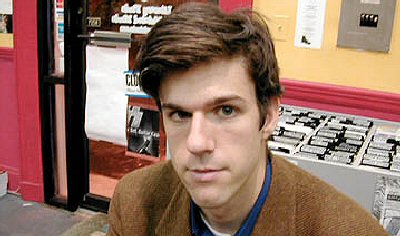
David Rees
Settled
A few thoughts about the recently-up trailer for Ron Howard’s Cinderella Man (Universal, 6.3).
One, it’s going be good…you can just feel it. Howard will never be Michelangelo Antonioni, but he seems to get slightly better with every film. The refinements just keep on coming.
Two, the trailer makes it clear that the story of Depression-era fighter Jim Braddock is basically another 1930s Seabiscuit thing — a 1930s athlete becoming an object of populist worship because he’s a come-from-behind underdog type.
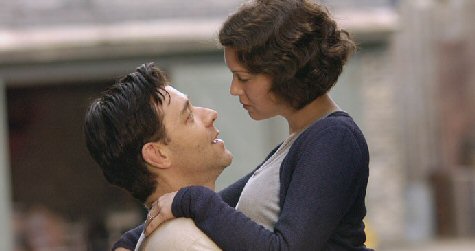
Russell crowe, Renee Zellweger in Cinderella Man
Three, Russell Crowe — pale and slim with a shock of black hair — looks soulful as shit, and again, you can just feel the Best Actor aura.
Four, the Renee Zellweger irritation factor (exacerbated by the last Bridget Jones film on top of the Oscar she got for her Granny Clampett acting in Cold Mountain…awful) may go down a notch or two with her performance in this. Just a feeling.
Five, there’s something earnest and extra-generous in Paul Giamatti’s performance as Braddock’s manager. It’s not a phone-in, as so many best friend/second-banana performances tend to be.
And six, Salvatore Totino’s slightly muted color cinematography looks beautiful.
Kid Flicks
Jett and I have co-written a piece for iVillage, the women’s website, about the movies I’ve shown him and his brother, Dylan, over the years in order to cultivate a respect for good films, or at least further an understanding about what’s crap and what isn’t.
It just went up and I think it’s pretty good. (Warning: you’ll never find it if you just go to the iVillage page.)
The link on Movie City News (tapped out, I assume, by David Poland) thinks the idea of me “influencing our children” is a “scary premise.” Yeah, I guess I’m not exactly Mr. Greenjeans. But then Poland takes his sister’s kids to every crappy kid movie out there, and I’m sure he thinks he’s being a great uncle.
I have this bizarre idea that bad movies can act like pollutants upon your soul, and that the most vulnerable in this respect are kids under the age of 10.
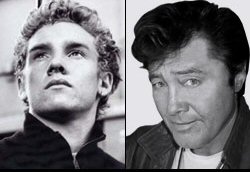
The message of our I-Village article, if it has one, is that trying to keep kids in a state of Disney World innocence by telling they can’t watch this or that adult-subject movie is, for the most part, futile.
Okay, really young kids should be kept away from sexuality, yes, but the most important thing you can do as a parent is to keep them away from bad films.
Some of my basic tenets:
(1) Good films expose kids to intangibles, and once the fundamentals sink in, your kids will respond better to great movies and less to crap on the tube.
(2) Don’t feed them just animated kiddie stuff when they’re really little. Some kids have it in them to understand or feel a bit more. If a film has a strong emotional current, under-fivers can absorb this without understanding the particulars.
(3) By the time they’re in grade school you’re not running the show any more. Boys of this age, in particular, are always going to be into action stuff, monster movies and broad (i.e., dumb) comedies that you’d rather they stay away from. No use fighting it.

(4) If anything, boys tweens are even more into mainstream flotsam and jetsam than grade-schoolers. And yet some tweens have been known to develop a certain cultivation and even curiosity about adult life at this stage.
I think I did a reasonably good job with these guys. Dylan’s tastes are fairly measured and sophisticated, and I totally love that Jett has recently been getting into Woody Allen movies (he just recently saw Manhattan and Annie Hall).
“Several of my friends have seen Pulp Fiction, Scarface and Thirteen,” Jett wrote. “Movies about drugs and drug-selling, like Go or Trainspotting, are also quite popular when some friends and I recently talked about what film to rent.
Jett’s final paragraph, not used in the I-Village piece, said that “some teenaged women are more than content to gawk at Johnny Depp’s bone structure, even when he’s wearing eye-liner. Guys, on the other hand, will blow their load for any film with flaming fissures or bosoms.”
